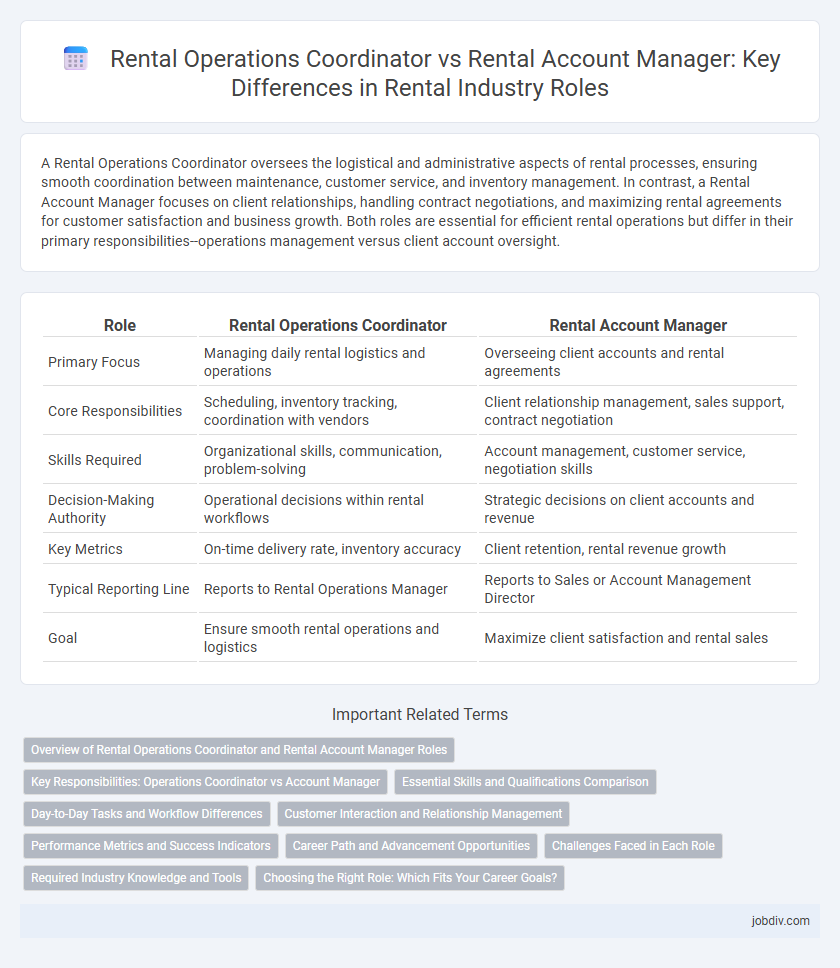A Rental Operations Coordinator oversees the logistical and administrative aspects of rental processes, ensuring smooth coordination between maintenance, customer service, and inventory management. In contrast, a Rental Account Manager focuses on client relationships, handling contract negotiations, and maximizing rental agreements for customer satisfaction and business growth. Both roles are essential for efficient rental operations but differ in their primary responsibilities--operations management versus client account oversight.
Table of Comparison
| Role | Rental Operations Coordinator | Rental Account Manager |
|---|---|---|
| Primary Focus | Managing daily rental logistics and operations | Overseeing client accounts and rental agreements |
| Core Responsibilities | Scheduling, inventory tracking, coordination with vendors | Client relationship management, sales support, contract negotiation |
| Skills Required | Organizational skills, communication, problem-solving | Account management, customer service, negotiation skills |
| Decision-Making Authority | Operational decisions within rental workflows | Strategic decisions on client accounts and revenue |
| Key Metrics | On-time delivery rate, inventory accuracy | Client retention, rental revenue growth |
| Typical Reporting Line | Reports to Rental Operations Manager | Reports to Sales or Account Management Director |
| Goal | Ensure smooth rental operations and logistics | Maximize client satisfaction and rental sales |
Overview of Rental Operations Coordinator and Rental Account Manager Roles
Rental Operations Coordinators oversee daily logistics, ensuring smooth equipment availability, maintenance scheduling, and efficient order processing to support rental operations. Rental Account Managers focus on client relationships, managing contract negotiations, account growth, and resolving customer issues to enhance rental portfolio performance. Both roles are critical in optimizing rental business efficiency, balancing operational execution with strategic client management.
Key Responsibilities: Operations Coordinator vs Account Manager
A Rental Operations Coordinator primarily oversees inventory management, coordinates equipment delivery and returns, and ensures seamless communication between logistics and field teams to optimize rental workflows. In contrast, a Rental Account Manager focuses on client relationship management, negotiating rental agreements, and driving customer satisfaction to maximize revenue opportunities. Both roles require strong organizational skills, but the coordinator zeroes in on operational efficiency while the account manager prioritizes client retention and business growth.
Essential Skills and Qualifications Comparison
Rental Operations Coordinators excel in organizational skills, attention to detail, and proficiency in managing rental schedules, inventory, and client communications, often requiring experience in logistics and customer service. Rental Account Managers prioritize relationship-building, negotiation, and sales expertise, with qualifications emphasizing client retention, contract management, and strategic account planning. Both roles demand strong communication abilities and familiarity with rental software, but Coordinators focus more on operational efficiency while Account Managers drive revenue growth through client-focused account management.
Day-to-Day Tasks and Workflow Differences
Rental Operations Coordinators manage daily logistics, including scheduling asset availability, coordinating maintenance, and ensuring compliance with rental agreements. Rental Account Managers focus on client interactions by handling contract negotiations, addressing customer inquiries, and tracking account performance metrics. Workflow differences center on internal operational efficiency versus external client relationship management within rental companies.
Customer Interaction and Relationship Management
Rental Operations Coordinators manage day-to-day logistics, ensuring smooth rental transactions and resolving immediate customer issues to maintain satisfaction. Rental Account Managers focus on building long-term client relationships, overseeing contract negotiations, and driving customer retention through personalized service. Both roles prioritize customer interaction but differ in scope, with Coordinators handling operational details and Account Managers managing strategic relationships.
Performance Metrics and Success Indicators
Rental Operations Coordinators are evaluated primarily on process efficiency metrics such as rental turnaround time, contract accuracy, and compliance adherence, ensuring smooth daily operations. Rental Account Managers focus on success indicators like client retention rates, revenue growth per account, and upselling success, driving strategic account development. Both roles require tracking key performance indicators (KPIs) that reflect operational excellence and customer satisfaction within rental services.
Career Path and Advancement Opportunities
Rental Operations Coordinators often start in entry-level roles focused on logistics and day-to-day rental processes, providing a strong foundation in vendor management and inventory control. Rental Account Managers typically advance by building client relationships and managing key accounts, paving the way for leadership roles such as Regional Rental Manager or Director of Rental Services. Progression from coordinator to account manager involves gaining strategic sales skills and industry knowledge, enhancing career growth within rental companies.
Challenges Faced in Each Role
Rental Operations Coordinators often face challenges in managing day-to-day logistics, ensuring timely vehicle availability, and resolving operational inefficiencies. Rental Account Managers encounter difficulties in maintaining client relationships, negotiating contracts, and meeting revenue targets amid competitive market conditions. Both roles require strong problem-solving skills but focus on distinct areas: operational execution versus client retention and sales growth.
Required Industry Knowledge and Tools
A Rental Operations Coordinator requires in-depth knowledge of inventory management systems, rental logistics, and scheduling software to efficiently handle daily operations and coordinate between departments. In contrast, a Rental Account Manager needs expertise in customer relationship management (CRM) tools, sales pipelines, and contract negotiation platforms to build client relationships and secure rental agreements. Both roles demand familiarity with industry standards and compliance regulations, but the Coordinator focuses more on operational efficiency while the Account Manager prioritizes client retention and revenue growth.
Choosing the Right Role: Which Fits Your Career Goals?
A Rental Operations Coordinator focuses on managing daily rental logistics, coordinating vehicle availability, and ensuring smooth operational workflows, ideal for candidates who thrive in hands-on, detail-oriented roles. In contrast, a Rental Account Manager emphasizes client relationship management, sales growth, and contract negotiations, suited for professionals aiming to develop strategic business partnerships and revenue optimization. Choose the role aligning with your strengths--operations coordination for organized execution or account management for client-focused business development.
Rental Operations Coordinator vs Rental Account Manager Infographic

 jobdiv.com
jobdiv.com